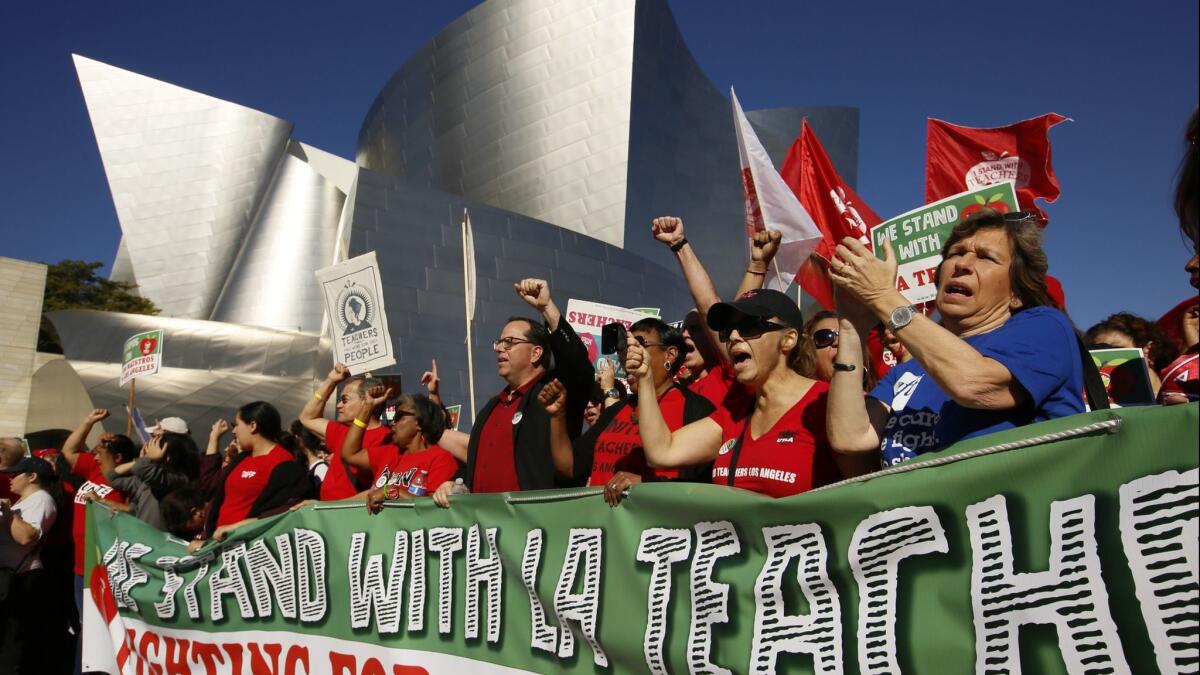L.A. teachers set to strike Jan. 10. Union says it has no plans for more negotiating

A labor agreement is not the only thing dividing the Los Angeles Unified School District and its teachers. One missing element crucial to coming together on a contract deal — and averting a strike — is trust.
On Wednesday, the union representing Los Angeles teachers announced that its 31,000 members will walk out Jan. 10 and that it has no plans to return to the negotiating table.
What would be the point? said Alex Caputo-Pearl, president of United Teachers Los Angeles, during a news conference at the union’s Koreatown headquarters.
“We are not going back into a bargaining process that has failed and that the district has not taken seriously for 20 months,” Caputo-Pearl said. “In this context, the traditional bargaining process has not worked.”
The union announcement came one day after L.A. schools Supt. Austin Beutner portrayed his side as the reasonable party in the dispute and said he was willing to negotiate around the clock.
The two sides appear to agree on very little.
Union leaders seem certain that those running L.A. Unified have a secret plan to dismantle traditional public education in Los Angeles. District officials seem just as certain that the union has always been determined to strike, even before negotiations began.
The district declares itself in financial straits too dire to meet many union demands. The union says there is money available.
“In textbook depictions of labor relations, unions and management move from conflict to coexistence if not collaboration,” said Charles Kerchner, a labor relations historian and professor emeritus at Claremont Graduate University. “That hasn’t happened in L.A.”
“A nationally known union leader once commented to me that UTLA’s good at one thing: fighting,” Kerchner said. But that’s not the only the problem, he noted. “The district also breeds distrust. Decades of externally pushed reform efforts have produced a siege mentality inside the district that extends through the administrative ranks into the teachers. There has been instability at the top, changing school board majorities and several embattled superintendents.”
The current dispute between the teachers union and the district has reached a point of peril that has not existed since the early 1990s — when a strike was narrowly averted — or even 1989, when one was not.
United Teachers Los Angeles represents teachers, counselors, librarians and nurses. About half a million students would be affected by a strike in the nation’s second-largest school system. Four in five students are from low-income families, and many families depend on their children being in school while they work.
Union leaders say they’ve chosen to take to the streets because the disruption to families is worth it, especially after years of inattention and inadequate funding have harmed generations of students.
“A few days of turmoil to make 25 years right,” Caputo-Pearl said. “We’re going to do that.”
District officials see such statements as more evidence that the union planned to strike all along.
To buttress this point, lawyers for L.A. Unified filed a complaint with the state Public Employment Relations Board, which oversees labor negotiations. The district cited numerous examples to allege that the union has not bargained in good faith. This week, PERB agreed to issue a complaint. It essentially says the district has submitted enough credible evidence to move forward with a hearing on the allegations.
“We need a willing party to negotiate, and that’s what’s we’ve been saying for months,” said school board member Nick Melvoin, an ally of Beutner’s. “The setting of a strike date is disappointing but also unsurprising given that we know they’ve been talking about a strike for years.”
The union also has alleged misconduct in the bargaining process in complaints before the labor board, saying the district has, among other things, failed to provide public records and improperly blocked teachers from talking to parents.
In earlier labor conflicts, the fundamental issues were salaries and benefits. Here, the divisions are broader.
School district leaders assert that the district will continue to have serious budget problems, risking insolvency in two or three years, even if a reasonable agreement is reached.
Union leaders reject the idea of a budget crisis — pointing to the district’s current large reserve — and say the existential danger is from Beutner and his allies.
According to this narrative, Beutner, a wealthy businessman with no prior work experience in a school system, wants to increase the number of privately operated, nonunion charter schools and weaken the union’s influence. That agenda would damage the long-term interests of most students as well as district employees, union leaders say. The union views everything through this lens, including the superintendent’s still-confidential plan to reorganize the district.
Few details of that plan have been publicly disclosed, but the Los Angeles Times has reported that the district would be divided into 32 networks. It alarms the union that consultants advising the district have worked in cities, such as New Orleans and Newark, N.J., where reform efforts included expanding the number of charter schools, weakening labor or both.
“Beutner is intentionally starving our schools by hoarding the reserves so that cuts can be justified, opening the pathway for his ultimate goal: to break up the school district into 32 networks, making our neediest schools more vulnerable to takeover attempts by corporate interests,” the union said in a statement Tuesday.
That conviction may make it challenging to end a strike quickly.
Beutner says the goal of his reorganization plan is to improve services to students and families by bringing more resources closer to schools.
Like the union, he says he is thinking of students and families in light of a possible strike. Among the points he makes is that children who don’t come to school during a strike would miss the meals that would be waiting for them there.
“A strike will be awful,” Beutner said Tuesday. “This is not going down on a Saturday or Sunday. This is of consequence. Think of the homeless student who is not going to get a meal. We serve a million meals a day.”
The superintendent has stated that many of the items on the union’s lengthy list of demands are reasonable, but also that the district cannot afford most of them at this time.
The union’s announcement came one day after district officials released a report by a fact-finding panel. The goal of the panel was to establish a base of information that both sides could agree on and that could propel them toward compromise and a settlement.
Ultimately, each side cherry-picked parts of the report to emphasize. For L.A. Unified, the big win was the panel’s unanimous endorsement of the district’s salary offer. The school system is offering a 3% raise retroactive to July 1, 2017, and another 3% taking effect from July 1, 2018. The union wants a 6.5% raise retroactive to July 1, 2016.
Caputo-Pearl said it would be misleading to focus on the split over wages.
“Austin Beutner continues to try to buy us off by focusing almost exclusively on salary,” he said Wednesday of the district’s salary offer. “We will not be bought off.”
The union pointed to the panel’s support for class-size reduction and schools fully staffed with nurses, counselors and librarians. The report did not state the cost of this new hiring or how it would be paid for.
The fact-finding process was the last step required under California law before the union could call a strike.
For its part, the district now has the legal authority to impose a contract. As of Tuesday, Beutner said that school officials had not decided whether they would take this step.
Setting a strike date is significant, and not just because it tells union members to prepare for it, said UCLA education professor Tyrone Howard.
“It elevates the stakes when a date is announced,” he said. “This is the proverbial line in the sand.”
Twitter: @howardblume
More to Read
Sign up for Essential California
The most important California stories and recommendations in your inbox every morning.
You may occasionally receive promotional content from the Los Angeles Times.











